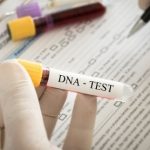DNA paternity testing is the use of DNA technology to provide information about the relationship between people usually this means the parentage of an individual (usually a child). The mother of the child is rarely in question, most of the time DNA testing is requested to determine the father of a child.
DNA is inherited from our parents, with half coming from the mother, and the other half from the father. This means that when the mother is not in dispute it is best to include her in the DNA paternity test so that you can eliminate the DNA the child inherited from her, this will leave only the DNA that came from the biological father.
The process is relatively simple in that the final DNA profile of the child is composed of a series of bands which can only come from the two parents. If the mother’s bands are deducted from the child profile the remainder must come from the biological father. Any male that may consider himself the father can have a DNA profile produced and compared against the remaining bands in the child’s profile.
There can only be two outcomes from this type of comparison. The first is an ‘exclusion’ scenario where the remaining bands in the child’s profile could not have come from the sample obtained from the alleged father. An exclusion eliminates the possibility of this individual being the biological father of the child. An exclusion is 100% accurate. The second outcome is an ‘inclusion’ in this scenario the remaining bands in the child’s profile could all be accounted for by comparison with the alleged father. If this is the case the strength of the match needs to be assessed by a DNA interpretation expert who will provide a degree of certainty associated with the likelihood that the alleged male is the biological father of the child. This means that there is no yes answer but rather a probability of paternity typically it is 99.9+%.
Before you purchase any Paternity DNA testing you should be sure you have clear answers to the following 4 key questions:
1. Has the DNA testing facility been accredited by a validated external body such as the American Association of Blood Banks (AABB). If the answer is no, do not have your testing done by this company, you may not be able to rely on the results.
2. Does the company carrying out the DNA testing have a thorough track-record in this area of work? Have they proved their technology in court? DNA profile interpretation can be a tricky business, and there is a lot at stake when you commission a DNA test, and you want to be able to rely on your service provider.
3. What degree of certainty does the company guarantee in relation to the results of the tests? An exclusion should be 100% with an inclusion at, at least 99.9+% confidence levels. These are the figures that are expected in most courts of law.
4. Does the internal quality standard require duplication of all results before they are reported to the customer? Or more simply put do the run all tests twice? This is an industry standard requirement which is often overlooked by some of the ‘cheaper’ DNA testing providers.
If the answer to any of these questions is unclear, my strong advice is to find an alternative provider. You do not want to trust such an important and life changing test to a company that does not guarantee a top quality product, with excellent customer care back-up.




